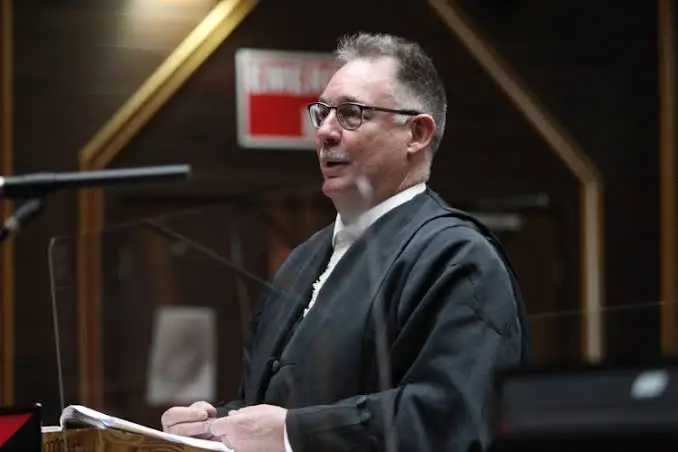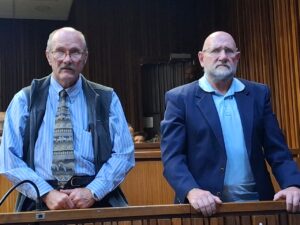By: Ambassador Carl ‘Mpangazitha’ Niehaus*
The obstinate refusal of Billy Downer, the lead prosecutor in the Zuma case, to recuse himself from the case goes against every legal principle enshrined in the Constitution, and the enabling legislation of the National Prosecuting Authority. It brings the administration of justice into disrepute and erodes the rule of law itself. The NPA Act enshrines, “impartiality of, and oath or affirmation by members of prosecuting authority” as follows:
(1) (a) A member of the Prosecuting Authority shall serve impartially and exercise, carry out or perform his or her powers, duties and functions in good faith and without fear, favour or prejudice and subject only to the Constitution and the law.
(b) Subject to the Constitution and this Act, no organ of state and no member or employee of an organ of state nor any other person shall improperly interfere with, hinder or obstruct the prosecuting authority or any member thereof in the exercise, carrying out or performance of its, his or her powers, duties and functions.
(2) (a) A National Director and any person referred to in section 4 must, before commencing to exercise, carry out or perform his or her powers, duties or functions in terms of this Act, take an oath or make an affirmation, which shall be subscribed by him or her, in the form set out below, namely- ‘I …. (full name) do hereby swear/solemnly affirm that I will in my capacity as National Director/Deputy National Director of Public Prosecutions/ Director/Deputy Director of Public Prosecutions/ prosecutor, uphold and protect the Constitution and the fundamental rights entrenched therein and enforce the Law of the Republic without fear, favour or prejudice and, as the circumstances of any particular case may require, in accordance with the Constitution and the Law. (In the case of an oath: So help me God’).
Section 7(2) of the Constitution in particular obliges the State to respect, protect, promote and fulfil the rights in the Bill of Rights. Accordingly, a perosecutor who cannot respect the Bill of Rights is a rogue and an outlaw who must not be allowed in any courtroom.
In the case of President Zuma, Downer’s role must be scrutinised to assess his compliance with the above precepts. I accept that in our country, the common law position of the Prosecution as dominus litis means that the prosecution can do what is legally possible to get or not to get criminal proceedings in motion for example, determining the charges and the duty and venue of trial. (S v Khamela and Five Similar cases 2008 SACR 165 (C) at 22 and 35). In Liebenberg v Minister of Safety and Security and Another (18352/07) [2009] the court recognized that a measure of control by the courts over decisions by the prosecution as dominus litis remains essential. This means that she cannot use the state power for vindictive, malicious and political purposes untethered to the pursuit of justice. The role of the NPA is to assist the court in reaching a just and fair verdict and – in the event of a conviction – a fair sentence based upon the evidence presented.
The requirement of independence, impartiality and integrity cannot be met when a prosecutor is labouring under the conflict of interest. As a former US prosecutor, Kenneth Melilli, stated: “No government official can effect a greater influence over a citizen than the prosecutor who charges that citizen with a crime. In many cases, the prosecutor determines the fate of those accused, at least in those cases where the evidence or statutory sentencing structure renders the ultimate outcome of the prosecution largely a foregone conclusion.”
Melilli contends that even when a criminal charge does not result in a conviction, the mere filing of the charge can have a devastating effect on an individual’s life, including potential pre-trial detention, loss of employment, embarrassment and loss of reputation, the financial cost of a criminal defence, and the emotional stress and anxiety attendant upon awaiting the finalisation of the case. According to Melilli, “[s]uch consequences may well have a permanent effect that is not cured even by an acquittal at trial”. He opines therefore that prosecutors, as many do, should, “regard the possibility of charging an innocent person as ‘the single most frightening aspect of the prosecutor’s job’”. Given the role, and indeed the enenrmous power power, which prosecutors have in the criminal justice system, the utmost in integrity, propriety and competence is required of them; they must adhere to the highest ethical and professional standards. Billy Downer does not have these qualities, as he is conflicted in the role he has played throughout the Zuma prosecution.
Downer has complained vociferously that Zuma, in his challenges, frequently attacked him, “in an attempt to discredit and disqualify” him as the prosecutor in his case. But that shows that Downer has very little understanding of a prosecutor’s role. In our constitutional scheme a prosecutor’s lack of “disinterestedness” is indeed a disqualifying factor, and any prosecutor who persists in prosecuting a case where he is conflicted, or has a personal stake, is indeed legitimately subject to challenges by the defendant.
Every criminal defendant in our country has a constitutional right to a prosecutor who is unbiased, neutral and/or disinterested. See, Smyth v Ushewokunze & another 1998 (2) BCLR 170 (ZS), where the court condemned a prosecutor who had “involved himself in a personal crusade” against the accused and lacked the objectivity, detachment and impartiality necessary to ensure that the State’s case was presented fairly. The Court assessed the evidence and concluded that it revealed that the prosecutor’s behaviour had fallen far short of the customary standards of fairness and detachment demanded of a prosecutor, which required him to conduct himself with due regard to the basic rights and dignity of the accused. Most importantly, the court stated that the accused’s right to, “a fair hearing by an independent and impartial court” embodied a constitutional value of extreme importance and had to be interpreted so as to include within its ambit not only the impartiality of the decision-making body but also the absolute impartiality of the prosecutor. ‘Impartial court’ had to be interpreted so as to embrace a requirement that the prosecution exhibit fairness and impartiality in its treatment of a person charged with a criminal offence. Accordingly, the prosecutor who displayed vindictive and biased attitude to the accused during investigation and remand proceedings was interdicted from taking any further part in preparation or presentation at trial of charges against accused. Other branches of the government must also avoid even the appearance of partiality or conflict of interest on the part of the prosecutor.
Downer arrogantly assumes that a prosecutor’s determination of an interest in the prosecution of a case, whether a personal interest or that of his office, may not be second guessed by anyone including the defendant and the Court. He arrogates to himself the right to unilaterally determine his disqualifying personal interest and does not believe that President Zuma, whose life and freedom are at stake, is entitled to scrutinize the prosecutor’s position constitutionally, professionally and ethically to determine when a conflict of interest or a violation of the Constitution exists.
Downer’s position is deeply flawed in several respects, as the responsibility of a public prosecutor differs from that of the usual advocate. First and foremost, his duty is to seek justice and not merely to convict. Second, the prosecutor is a constitutional officer duty bound by oath to prosecute the cases within his jurisdiction. The prosecutor does not have the luxury of choosing the cases within his jurisdiction. Third, in a criminal prosecution constitutional concerns are typically implicated in a more profound matter than in civil cases.
In his court papers, Downer has cited the “Spy Tapes” case as an example of Mr. Zuma attacking him in “an attempt to discredit and disqualify” him as the prosecutor. Downer assiduously omits the fact that (1) senior prosecutors in the NPA agreed with President Zuma, and actively opposed the DA review application; (2) that Mr. Downer went “rogue” by publicly disagreeing with the official NPA position and subsequently providing a supporting Affidavit to the political party, the Democratic Alliance, which sought to attack and discredit both the NPA and Mr. Zuma; (3) that the “Spy Tapes” revealed unequivocal and crystal clear evidence that there was indeed political meddling in the prosecution of President Zuma and that his complaints to that effect were all fully justified.
Downer must be removed from the Zuma case and the prosecution must be forced to proceed with trial forthwith. Anything less is a travesty of justice.

President of the African Radical Economic Transformation Alliance







